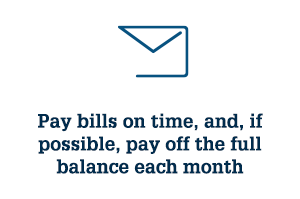Credit Basics
Level up your credit with information, resources, and tools — and take an important step toward reaching life’s big goals, like homeownership.
Let’s start by learning more about credit
Your credit history and credit score are important factors when applying for a mortgage. The better your credit score, the more likely a creditor is to trust that you’ll pay them back. A strong credit history can help you toward your goal of homeownership.
Simple steps to build credit
Building good credit is all about how you spend the money you earn and how much debt you take on. These steps can help you establish, build, and manage your credit.





Managing your debt
The amount of debt you have can make a big impact on your credit score. That’s why healthy debt management habits are important to help improve your chances of being approved for a loan — and benefit your overall financial health.
Credit usage
Your credit utilization ratio refers to the amount of credit you are using compared to the total credit you have available to you. It can be calculated by taking the total balance for all your credit cards and dividing it by your total available card limits.
Try to keep this ratio at less than 30% — in other words, use less than 30% of your available credit limit — to build and sustain a higher credit score.
Manage credit usageDebt-to-income ratio
Your debt-to-income (DTI) ratio is the amount you owe on all outstanding debts compared to your income before taxes. It’s a key indicator that lenders use to understand whether you can afford a mortgage payment.
DTI is shown as a percentage. The lower the percentage, the more access you’ll typically have to new loans. Paying off existing debts and not incurring new debts help to lower this number.
Calculate your DTI








